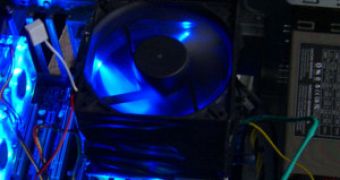Up until now, many hardcore overclockers managed to break the 4GHz barrier with sophisticated watercooling, phase-change or liquid nitrogen-based devices, but no one has ever boosted a CPU over the 4 GHz limit with air-based devices only.
Known for record-breaking achievements, this Israeli website's community is proud to announce the first +4GHz overclocked CPU, which is cooled with a powerful air-based solution solely. Responsible for this record is Guy Ziskin, moderator of the Overclocking & Cooling forum section of the Israeli website. Guy broke the record with an Intel Core 2 Extreme Q6700 processor (QX6700), Intel's quad-core CPU, which features a 2.66GHz stock clock for each of the four cores. Hardware analysts previously pointed out that this CPU is quite a hard nut to crack when it comes to raising the stock CPU clocks, but Guy Ziskin now proves that the CPU can stably operate at +4GHz frequencies.
According to the Israeli website, Guy did a little bit of research, which led him to use the QX6700 CPU along with the ASUS R.O.G Commando motherboard. The CPU was cooled by nothing but air and Guy was able to reach a maximum non-stable frequency of 4241MHz. However, at this particular clock speed, the system was so unstable that even taking a screenshot was impossible and the assisting team had to take a photo of the screen with a digital camera.
Bringing the CPU to 4101.9 MHz made it possible to run the SuperPi test, the overclocked system completing the procedures in only 12.68 seconds. This amazing speed was achieved with ThermalTake's BigTyphoon heat sink, to which Ziskin added two 120mm fans, on top of the existing fan. Bringing the QX6700 to such a high clock speed required a very high voltage of V1.735, with an enormous loss of V0.115, but the temperatures remained within the reasonable range ? up to 75c under full load.
The guys from HWZone now invite anyone to outdo their achievement, reserving an honorable place in their Overclocking Database.

 14 DAY TRIAL //
14 DAY TRIAL //